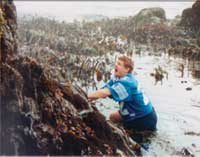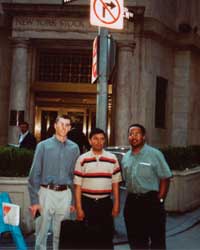When
It Comes to Students, SC Is Out to Launch
This is the tale of some typical Southwestern
College students. They enrolled, took classes, cheered athletic teams,
made friends, ran track, ran for student offices, studied.well, you
get the picture.
But their typical Southwestern College
educations included experiences that were atypical for students at most
colleges. These students also spent time at the New York Stock Exchange,
dissected dolphins, helped patients in a Mexico clinic, and (get this)
earned a staff position on the Jerry Springer Show.
Okay, so it's not Masterpiece Theatre.
But it is the top-rated syndicated daytime television show, and Angie
Gentry saw her name run in the closing credits even before she earned
her mass communications and film degree May 6. A final semester internship
turned into a full-time position as a production assistant.
She, like the others described here, are
living Southwestern's slogan: Come Here. Go Far.
When the college settled into this tagline
more than six years ago, there was none of the angst that often accompanies
a new marketing campaign. The promise to prospective students fit like
a comfortable sweatshirt.
"'Come Here. Go Far.' gets at the outcomes
of a Southwestern College education," says Brenda Hicks, director of
admission. "It's a small town and a small community and a small college,
but if you come here, the college is about launching you, about getting
you out and experiencing things."
Launching students? Southwestern may be
the leader in this field. Consider these students, who went far even
before graduating.
Of course, 'Come Here. Go Far.' isn't a
self-fulfilling prophecy. The common thread running through the varied
experiences of SC students is personal initiative, and willingness to
take a chance.
"It's not a catapult," Hicks cautions.
"If you're coming in as a student, SC can launch you, but you have to
assist. If you're willing to step on the trampoline and hop a few times,
though, there's no limit to how high you can jump."
Angie Gentry, Tulsa, mass communications
and film, production assistant on 'Jerry Springer Show':
 "Everyone
tells me that I have one of the best jobs and not to brag, but I do,"
Angie says. "I get to do what I have been training for in school. I
guess all of those endless nights editing, hours writing press releases
in the communications office, and classes that I thought would never
apply to anything prepared me to do what I love. My producer said that
one of the reasons I was hired was because of all of my hands-on experience
I have had at Southwestern. I never realized that 'a world without boundaries'
really applied to me."
"Everyone
tells me that I have one of the best jobs and not to brag, but I do,"
Angie says. "I get to do what I have been training for in school. I
guess all of those endless nights editing, hours writing press releases
in the communications office, and classes that I thought would never
apply to anything prepared me to do what I love. My producer said that
one of the reasons I was hired was because of all of my hands-on experience
I have had at Southwestern. I never realized that 'a world without boundaries'
really applied to me."
Junior nursing students, spring break
in Juarez, Mexico, clinics:
"A world without boundaries" took on new meaning for this group, which
clearly saw the divide between their world and the world they had entered.
Jenni Ireland summed up the boundary between El Paso, Texas, and Juarez,
Mexico: A stream of water separated wealth from poverty, nutrition from
starvation, and health from disease. But working in medical and dental
clinics and retirement homes during spring break 2001, the five students
discovered internal boundaries were being erased. "Having had the opportunity
to experience life, for such a short period, in Mexico allowed me to
reflect on how I can become a better nurse once I graduate and overall
a better person," Ireland says. "I saw up close and personal what the
power of love and faith can do to an entire population."
Paul Mages, Spearville, biology, undergraduate
marine research:
 Marine
biology? In a landlocked Kansas college? It works. Summers at the Oregon
Institute of Marine Biology and the Shannon Point Marine Center (Western
Washington University) gave research experience that will carry Paul
into a career as a marine biologist. As recipient of a Research Experience
for Undergraduates grant from the National Science Foundation, Mages
completed a semi-independent research project under the tutelage of
a faculty member. "I discovered that experimenting is a continuing process,
it's always on-going, and there's always a better way to do it," he
says. Mages graduated with honors in May, and hopes to parlay his experience
into a position at the Florida Sea Camp.
Marine
biology? In a landlocked Kansas college? It works. Summers at the Oregon
Institute of Marine Biology and the Shannon Point Marine Center (Western
Washington University) gave research experience that will carry Paul
into a career as a marine biologist. As recipient of a Research Experience
for Undergraduates grant from the National Science Foundation, Mages
completed a semi-independent research project under the tutelage of
a faculty member. "I discovered that experimenting is a continuing process,
it's always on-going, and there's always a better way to do it," he
says. Mages graduated with honors in May, and hopes to parlay his experience
into a position at the Florida Sea Camp.
Jason Dixon, Norman, Okla., and Josphat
Muturi, Kenya, business administration, investment trip to New York:
If ever a student was poised to do well in a class, it was Jason Dixon.
He bought his first mutual fund stock at age 16, a $500 investment accumulated
from birthday gifts and odd jobs. He watched and learned and traded
as the stock market shot up, then down, during the past five years.
And then, during the fall semester 2000, when prize for best-earning
portfolio in an investment class was a trip to New York City, he had
the steady nerves to ride out the market's convulsions. During the four-month
class Dixon's e-Trade "investments" dropped 30 percent during the first
three months, but made $132,000 in one day to earn Dixon the trip funded
by the estate of Margaret Smith, Liberal. Josphat Muturi called the
other side of the coin, winning the second spot in the trip by investing
carefully in Fortune 500 companies, IPOs, and other more conservative
investments. Their varied investment styles reflect their personalities-Dixon
is a self-described "true gambler at heart," and Muturi admits if he
lost real money on the market he'd quit investing. But both went far.
